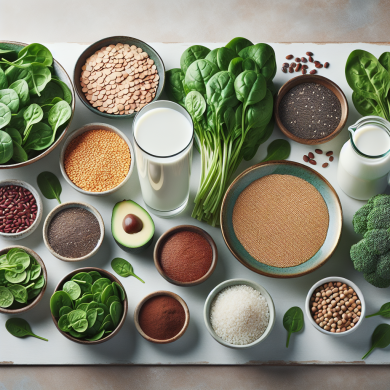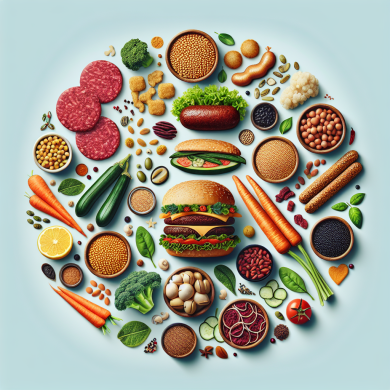Unlock Vibrant Health with a Vegetarian Diet
Introduction
The pursuit of vibrant health is a journey many embark on, and diet plays a crucial role in achieving this goal. Among the various dietary choices available, a vegetarian diet stands out for its numerous health benefits. By eliminating meat and focusing on plant-based foods, individuals can enjoy a holistic approach to nutrition that supports overall well-being. This article explores the components of a vegetarian diet, its health benefits, potential challenges, and practical tips for transitioning and maintaining this lifestyle.
The Foundations of a Vegetarian Diet
A vegetarian diet primarily consists of plant-based foods, such as fruits, vegetables, legumes, nuts, seeds, and grains. Unlike veganism, vegetarians may still consume animal by-products like dairy and eggs. There are different types of vegetarian diets, including:
- Lacto-vegetarian: Includes dairy products but excludes eggs.
- Ovo-vegetarian: Includes eggs but excludes dairy products.
- Lacto-ovo vegetarian: Includes both dairy products and eggs.
- Pescatarian: Includes fish and seafood, alongside plant-based foods.
Each variation offers flexibility, allowing individuals to choose the best fit for their lifestyle and nutritional needs.
Health Benefits of a Vegetarian Diet
Adopting a vegetarian diet can lead to a multitude of health benefits, which are supported by a growing body of scientific research. Key benefits include:
Improved Heart Health
A vegetarian diet is typically rich in heart-healthy foods, such as whole grains, nuts, seeds, fruits, and vegetables. These foods are high in fiber, antioxidants, and healthy fats, which contribute to lower cholesterol levels and reduced risk of heart disease. Studies have shown that vegetarians often have lower blood pressure and a reduced risk of developing hypertension compared to their meat-eating counterparts.
Weight Management
Vegetarian diets are often lower in calories and saturated fats, making them an effective choice for maintaining a healthy weight. The high fiber content of plant-based foods promotes satiety and helps control appetite, reducing the likelihood of overeating. Research indicates that vegetarians tend to have lower body mass indexes (BMIs) and are less likely to be obese compared to non-vegetarians.
Reduced Risk of Chronic Diseases
A diet rich in fruits, vegetables, and whole grains provides essential nutrients and antioxidants that help combat chronic diseases. Vegetarians have a lower risk of developing type 2 diabetes, certain types of cancer, and metabolic syndrome. The anti-inflammatory properties of plant-based foods also contribute to overall health and longevity.
Digestive Health
The high fiber content in a vegetarian diet supports digestive health by promoting regular bowel movements and preventing constipation. Fiber also acts as a prebiotic, nourishing the beneficial bacteria in the gut, which supports a healthy microbiome and boosts immune function.
Potential Challenges and Solutions
While a vegetarian diet offers numerous benefits, it can also present certain challenges. Being mindful of potential nutritional deficiencies and ensuring a balanced diet is essential for long-term health.
Protein Intake
One common concern for vegetarians is obtaining sufficient protein, as meat is a primary source. However, there are plenty of plant-based protein sources available, including beans, lentils, chickpeas, tofu, tempeh, quinoa, nuts, and seeds. Combining different protein sources can provide all essential amino acids needed for optimal health.
Vitamin B12 Deficiency
Vitamin B12 is primarily found in animal products, making it a potential concern for vegetarians. To prevent deficiency, vegetarians should consume fortified foods, such as plant-based milks and breakfast cereals, or consider taking a B12 supplement.
Iron and Zinc Absorption
Although plant-based foods contain iron and zinc, they are often less bioavailable than the forms found in meat. Consuming vitamin C-rich foods alongside iron-rich plant foods can enhance absorption. Additionally, including a variety of legumes, nuts, seeds, and whole grains can help meet zinc requirements.
Practical Tips for Transitioning and Maintaining a Vegetarian Diet
Transitioning to a vegetarian diet can be a rewarding experience, but it may require some adjustments. Here are practical tips to ease the transition and maintain a balanced vegetarian lifestyle:
Start Slowly
Gradually reduce meat consumption by incorporating more plant-based meals into your diet. Begin with “Meatless Mondays” or choose vegetarian options for certain meals each week to ease the transition.
Experiment with New Recipes
Explore a variety of vegetarian recipes to keep meals exciting and flavorful. Try different cuisines, such as Indian, Mediterranean, or Thai, which often feature delicious vegetarian dishes.
Plan Balanced Meals
Ensure your meals contain a mix of macronutrients (proteins, fats, and carbohydrates) and micronutrients (vitamins and minerals). Incorporate a variety of fruits, vegetables, whole grains, legumes, nuts, and seeds to meet nutritional needs.
Stay Informed
Educate yourself about vegetarian nutrition to avoid deficiencies and ensure a well-rounded diet. Consider consulting a registered dietitian for personalized guidance and support.
Connect with a Community
Join vegetarian groups or forums to share experiences, gather tips, and find support from others on the same journey. These communities can provide valuable insights and motivation.
Conclusion
A vegetarian diet offers a pathway to vibrant health by providing numerous benefits, from improved heart health and weight management to reduced risk of chronic diseases and enhanced digestive health. While there are potential challenges, they can be overcome with careful planning and informed choices. By adopting a balanced vegetarian diet, individuals can enjoy a sustainable and healthful lifestyle that supports overall well-being. Embrace the journey to vibrant health through a vegetarian diet and unlock the potential for a healthier, more fulfilling life.















Add comment